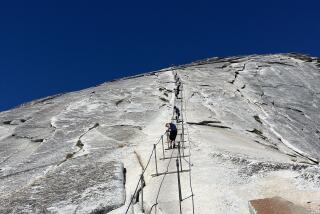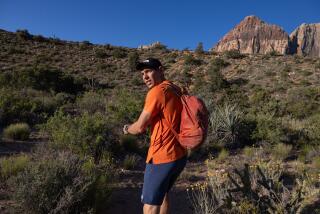Karma Climber
- Share via
If Chris Sharma were an animal, he’d be an iguana--a mutable, deliberate animal, a relative loner in the natural world, so quiet you’d barely know he’s there. The iguana is big on hanging out, which is to say it doesn’t really ask for much, other than a nice stick, or the side of a rock. It’s a serene creature and quite beautiful.
Sharma is quiet, amiable, yet fairly aloof. He likes to hang out in nature, on rocks. He is a beautiful young man: 6 feet with blond hair, golden skin and blue eyes shaped like almonds. His limbs are long and coltish. His face--all smooth, broad planes--is almost biblical. He has huge hands, with long fingers that grasp the tiny features of a rock as if they were made of Velcro. Those hands and those seemingly unnatural feats have helped make him the greatest natural rock climber in the world.
At the tender age of 21, he is in his sixth year on the pro circuit, scaling boulders and cliffs from California to Thailand. His natural coordination has made him a legend in the free-climbing world and earned him dozens of awards, including the top prize at the X Games in 1999. Last summer he won the annual Gorge Games, a major event held at the Columbia River Gorge in Oregon, and he currently is atop the rankings in the Professional Climbers Assn., which tracks competitions in the U.S.
Though he’s been featured in many climbing magazines, Sharma is nonchalant about the attention. “It’s a trip how much focus there can be on one person,” he says, and adds: “There’s a lot of good climbers. I think I’ve kind of been in the right place at the right time.” He describes himself as a “snorkeler” in this world: “It’s your own thing. You can do whatever you want. It’s all about trying your hardest and pushing your limits. It’s very individualistic.”
Dean Fidelman, a rock climber from Southern California who’s known Sharma for years, says he has a “specific, and rare, kind of vibe for a climber. He’s disarming. He can be charming and totally genuine, but at the same time he has this antic, dangerous, vulnerable side that makes you identify with him.
“I really don’t think he understands just how good he is.”
Maybe he doesn’t. Chris Sharma’s gift is that of the prodigy: an innate talent that has neither a beginning nor an end, but is simply there. Sharma has an ability, as he says, to “forge a one-ness with the rock”--to feel its vibe, so to speak--and it’s something he admits he doesn’t fully understand. “It’s just one of those things you feel in your body,” he says. “You get into climbing when you’re young, and it’s much easier.”
Perhaps, but few climbers have approached what Sharma has mastered on two fronts: bouldering, which is strictly gear-free climbing, and sport climbing, where Sharma has had spectacular successes, including Biographie Extension, a daunting challenge in Ceuse, at the foothills of the French Alps.
Dozens of Sharma’s peers had tried, and failed, to conquer what was considered the world’s hardest sport climb--a 120-foot route up a wall that juts out at an impossible 30-degree angle. Such paths are laid out by other climbers who, rappelling from the top down, secure the bolt hangers that are used as a safety tether. But the climb is otherwise just hands and feet gripping the small indentations and fissures in the wall. And a successful ascent means no falling--a single slip, even from one bolt to the next one down, means starting over.
Biographie Extension wasn’t easy for Sharma. He and many others had climbed the first 100 feet, but no one had made it through the last, arduous 20 feet. Sharma had made dozens of unsuccessful attempts over the course of four years before finally making the first ascent of the entire route in July 2001. He christened his climb “Realization.” No one else has completed the ascent. But Sharma isn’t one to get too caught up in singular achievements.
“I just like the pure movement, the creative aspect of how you have to conform to nature,” he says. “It’s like you have to find the key of how to connect with the rock.”
On a rainy afternoon in Santa Cruz, Sharma is hanging out, doing what he normally does when not climbing: scrutinizing a wall at the local climbing gym, Pacific Edge, thinking about climbing. Watching him analyze the wall is a 30ish guy in khaki shorts who alternates his gaze from Sharma to a large poster of Sharma and then back. “Excuse me,” he says, finally mustering his courage. “Did anyone ever tell you you look exactly like Chris Sharma?”
He smiles. “Yeah, people say that.”
“Are you Chris Sharma?”
The legend extends his hand. This kind of thing happens to him, often but not exclusively, at this same gym where he took up the sport at the age of 11, with money saved from his paper route. The gym is packed with kids not much younger than Sharma was then. Of the adults, several have already approached Sharma, offering their hellos with the kind of tentative hero worship of a regular guy made good; others observe him shyly, whispering to one another.
“Man, I been watching you for an hour,” one fan says. “I knew it was you.” He prattles on for several more minutes. Finally he excuses himself to go climb, holding his hand a bit apart, as if he might never wash the thing again.
Sharma is the only son of Gita and Bob, who were given the name “Sharma,” which means “happiness, good fortune and prosperity,” by the Indian guru Baba Hari Dass. Sharma was, by his own admission, a terrible athlete when it came to organized sports. “Like, I remember in baseball, I was always afraid of the ball. It was going so fast. I was really intimidated.” He grins.
Climbing, however, was a “no pressure” sport (“The only opponent is yourself,” Sharma says). He started in sixth grade; by the time he was 14, he’d graduated from a 90-pound star of the local climbing gym to the UIAA Youth World Championship title, administered by the International Council for Competition Climbing. By 15, he’d left high school and gone pro, with a nervous nod from his mother and the sponsorship of climbing outfitters such as Five Ten and Prana. He later earned his GED, and at age 16 became the first U.S. male climber to win a World Cup competition at the adult level.
While most kids were dealing with adolescent angst, Sharma was on his own, free to travel where and when he wanted, with climbers at least 10 years his senior. Regrets? Not really. “The opportunity presented itself then, so I took it,” he says. “So I missed out on, like, math. I can always go back and do that later on. I won’t be able to go back and do this.”
True, but the wandering vagabond life leaves little room for other pursuits. Friends? Some are his age, more are in their late 20s and 30s. Girls? He’s had a few girlfriends, most of them older as well. “Climbing,” he says, “is very goal oriented.”
Sharma admits that “it’s kind of a bummer” when he’s not on a rock. “I could chase around climbing goals and never be satisfied.” Sharma looks slightly discontented with this idea, but then, contentment is a choice, he is careful to explain.
Sharma is a practicing Buddhist. When he’s not climbing, he visits the local Zen center to meditate at 5:45 each morning. “It gives me a lot of clarity,” he says.
“Clarity,” and all the vague New Age-iness it connotes, is central to Sharma’s character. In October 2000, he dropped out of the American climbing scene completely, spending the next seven months traveling through Asia. Though he visited such climbing hot spots as southern Thailand and India, the highlight of the trip, he says, was the six weeks he spent walking around Shikoku, Japan, on a pilgrimage to the island’s 108 temples.
Outfitted in traditional white robes, straw hat and walking stick, he walked 20 miles per day, he estimates, and barely spoke--more of a practicality, given that he doesn’t speak much Japanese. He carried a sleeping bag and slept wherever he chose: in the woods, in public bathrooms, at bus stops and, often, in the rain. “It was so cool because sometimes we get caught up in our unreal ideas, you know? Like, our society breeds a neurotic, greedy lifestyle. It’s hard to be clear.”
It was after this trip that, with renewed energy, he accomplished his climb of Biographie Extension. Days later he won the World Cup bouldering competition in Munich, only to relinquish the title when he tested positive for marijuana. But it was just a blip in a world that is known for free spirits. Sharma’s sponsors kept him on board (they provide clothing, equipment, some travel support and a stipend) and his notoriety within climbing circles has only grown.
Chris Sharma is over the coolness of this by now since, after all, he’s been climbing professionally for a quarter of his life. He thinks a minute. “I have a pretty good situation, but I’m not that caught up in the whole climbing thing--like I don’t need climbing to have self-worth. It’s just one thing I do.”
But for now, it will suffice. “It’s a good situation. I think I’ll do it for the rest of my life.”


